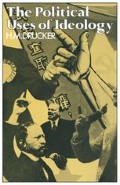Abstract
Lucien Goldmann, a French Marxist philosopher, propounds a fascinating analogy which leads to the suggestion that capitalism is a hero in a great world-historical tragedy.1 The notion is worth pursuing. Surely capitalism has many of the characteristics of a tragic hero. It enters the stage of history fully worthy of respect; it is the successor to feudalism. It gains stature through the action of its own rich inner resources. It changes the face of the world. It comes to rule the world in a way no other has ever ruled it. Its needs are filled by the rape of the world’s mineral resources. Morality, government and laws are ruthlessly brushed aside and changed to suit its whim. For all these reasons capitalism is worthy of our honour. For these reasons, too, it attracts our interest and wonder; it carries the mantle which the Greeks hung on their God-Men and the Christians on their Man-God. It is the primary object of awe in our culture.
Access this chapter
Tax calculation will be finalised at checkout
Purchases are for personal use only
Preview
Unable to display preview. Download preview PDF.
Notes and References
L. Goldmann, The Hidden God: A Study of Tragic Vision in the Pensées of Pascal and the Tragedies of Racine (London, 1964) pp. 278 ff.
A. Koestler, Darkness at Noon (London, 1964; original ed. 1941) p. 226.
Cf. M. Merleau-Ponty, Humanism and Terror: An Essay on the Communist Problem, trans. with notes by John O’Neill (Boston, 1969; original French ed. 1947) p. xxxvii.
Ibid., p. 9.
Koestler, Darkness at Noon, p. 224.
I. Howe, Politics and the Novel (New York, 1957) pp. 19, 227–8.
See G. Steiner, The Death of Tragedy (London, 1961) pp. 31–3, 232.
Milton, Samson Agonistes, lines 80–2.
G. Lukács, The Historical Novel (Harmondsworth, 1969; originally published 1937) pp. 150 ff.; Steiner, The Death of Tragedy, pp. 113, 195–7.
See below, Chapters 10 and 11.
C. J. Friedrich and Z. K. Brzezinski, Totalitarian Dictatorship and Autocracy (London, 1956).
G. Lukács, Solzhenitsyn (London, 1969) p. 14.
Author information
Authors and Affiliations
Copyright information
© 1974 H. M. Drucker
About this chapter
Cite this chapter
Drucker, H.M. (1974). Koestler’s Darkness at Noon. In: The Political Uses of Ideology. Palgrave Macmillan, London. https://doi.org/10.1007/978-1-349-02096-6_8
Download citation
DOI: https://doi.org/10.1007/978-1-349-02096-6_8
Publisher Name: Palgrave Macmillan, London
Print ISBN: 978-1-349-02098-0
Online ISBN: 978-1-349-02096-6
eBook Packages: Palgrave Political & Intern. Studies CollectionPolitical Science and International Studies (R0)

